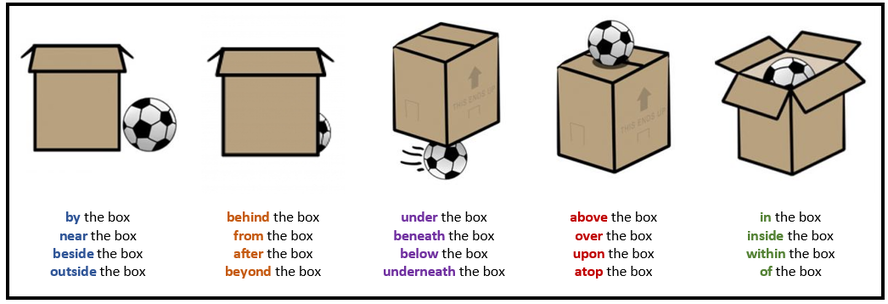All languages have words that show where objects are in proximity to one another. These are referred to as positional parts of speech and come in three types: prepositions, where the positional word comes before the object; postpositions, where the positional word comes after the object; and adpositions, where the positional word comes in the middle of the phrase (only found in Asian languages). ENGLISH ONLY USES PREPOSITIONS.
To determine what words can be prepositional, think about a ball and a box:
To determine what words can be prepositional, think about a ball and a box:
Here are all the single words that are ALWAYS prepositions in American English
against
amid
among
apropos
at
barring
beside
between
by
chez
circa
contra
despite
during
following
from
in
into
of
onto
past
per
qua
in re
regarding
respecting
sans
saving
times
to
toward
unto
upon
versus
via
vis-à-vis
with
amid
among
apropos
at
barring
beside
between
by
chez
circa
contra
despite
during
following
from
in
into
of
onto
past
per
qua
in re
regarding
respecting
sans
saving
times
to
toward
unto
upon
versus
via
vis-à-vis
with
Here are all the single words that are SOMETIMES prepositions in American English
a (three times a day)
aboard (She was aboard the ship)
about
above
absent
across
after
against
along
aloft
alongside
amid
amidst
mid
midst
among
apropos
around
round
aslant
astride
at
atop
bar
barring
before
behind
below
beneath
neath
beside
besides
between
beyond
but
by
chez
circa
come
concerning
contra
counting
cum
despite
down
during
effective
ere
except
excepting
excluding
failing
following
for
from
in
including
inside
into
less
like
minus
modulo
near
nearer (comparative)
nearest (superlative)
next
notwithstanding
of
off
offshore
on
onto
opposite
out
outside
over
pace
past
pending
per
plus
post
pre
pro
qua
re
regarding
respecting
sans
save
saving
since
sub
than
through
throughout
till
times
to
toward
under
underneath
unlike
until
unto
up
upon
versus
via
vis-à-vis (formal)citation needed
wanting
with
within
without
worth
aboard (She was aboard the ship)
about
above
absent
across
after
against
along
aloft
alongside
amid
amidst
mid
midst
among
apropos
around
round
aslant
astride
at
atop
bar
barring
before
behind
below
beneath
neath
beside
besides
between
beyond
but
by
chez
circa
come
concerning
contra
counting
cum
despite
down
during
effective
ere
except
excepting
excluding
failing
following
for
from
in
including
inside
into
less
like
minus
modulo
near
nearer (comparative)
nearest (superlative)
next
notwithstanding
of
off
offshore
on
onto
opposite
out
outside
over
pace
past
pending
per
plus
post
pre
pro
qua
re
regarding
respecting
sans
save
saving
since
sub
than
through
throughout
till
times
to
toward
under
underneath
unlike
until
unto
up
upon
versus
via
vis-à-vis (formal)citation needed
wanting
with
within
without
worth
Prepositions can be single words but can also be phrasal, as in the examples of expect for, in spite of, and next to. They can also come at the end of an action verb to form an informal phrasal verb like sat down, threw up, coming up, or messing around (see the verbs page). Unless part of a phrasal verb, prepositions always start a prepositional phrase, which starts with a preposition and ends with an object (noun or pronoun). These phrases are adjectival or adverbial in nature, depending on which modifying question they answer (see the modifiers page for more).
Practical question: Can I end a sentence with a preposition?
Sometimes. The literal definition of a preposition is that it is before (pre) a word to show its relationship (position), so the hard and fast rule for centuries has been that sentences cannot end with a preposition. However, modern grammar has allowed for some practical exceptions to this rule:
1) If the preposition is actually part of the phrasal verb: I think I'm going to throw up.
2) If the sentence is a question with the object of the preposition earlier in the sentence: What are you waiting for?
3) When a writer wants to shift a verb's placement in the sentence to create emphasis: We know which door the prize is behind.
